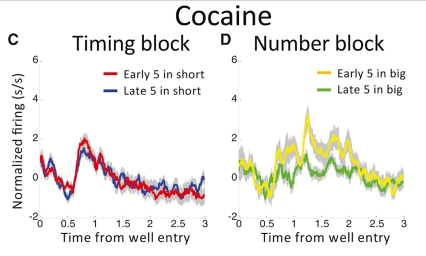Both humans and animals need to be able to predict future rewards or negative consequences to guide their behaviors. They also need to know when these predictions are violated, such as when an expected reward does not materialize, or an unexpected reward does. To enable this “error detection,” neurons in the midbrain send key teaching signals via the neurotransmitter dopamine. In a new animal study, scientists at NIDA’s Intramural Research Program have demonstrated that cocaine use profoundly disrupts these teaching signals.
Scientists trained rats to self-administer cocaine over a two-week period and then removed the cocaine for at least a month. They then ran the rats through an exercise offering the possibility of a reward (sucrose) while measuring dopamine activity in the ventral tegmental area (VTA) of the brain. In rats with a history of cocaine use, VTA dopamine neurons continued to fire when the reward was taken away and did not increase firing properly in response to an unexpected reward. These findings suggest that brief cocaine use changes the ability of these neurons to signal predictive errors. They are also consistent with studies showing that cocaine reduces such signaling in prefrontal and striatal regions of the brain that send inputs to the VTA, suggesting that the VTA is not receiving information about expected outcomes from these regions.
The scientists concluded that changes in how dopamine neurons process information following drug use could lay the foundation for progression to addiction. They may also affect how the brain processes signals related to the consequences of behaviors other than drug use.
Study:
- Takahashi, Yuji K; Stalnaker, Thomas A; Marrero-Garcia, Yasmin; Rada, Ray M; Schoenbaum, Geoffrey. Expectancy-related changes in dopaminergic error signals are impaired by cocaine self-administration. Neuron.
*--Recorded in blocks of trials when unexpected rewards were presented to be learned about. In normal rats, dopamine neurons will show sharp increases in firing initially in these trial blocks at the time of reward (early), which are then reduced after the rats learn to expect the new rewards (late). In the cocaine-experienced rats, the activity of the neurons fails to show these sharp increases early in these blocks. The increase in firing is either entirely absent when a single reward is presented (left) or reduced and temporally non-specific when additional rewards are added behind an expected reward (right).

